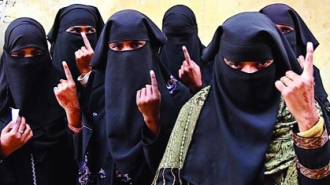All India Majlis-e-Ittehadul Muslimeen chief Asaduddin Owaisi is urging muslims to vote along religious lines. What does he have in mind?
Was it to boycott other community candidates or to get more Muslims into legislative chambers or was it to avenge the takeover of Nizam’s State by New Delhi in 1948? Because his grandfather, Abdul Rashid was the right-hand man of Kasim Razvi who headed the Nizam’s unofficial roughnecks called the Razakars.
My earlier impression was that educated Muslim leaders must think before they articulate in public. This view somewhat faded recently after I read a book, Pathway to Pakistan, by Chaudhry Khaliquzzaman, the leader who succeeded Muhammad Ali Jinnah as the president of the Muslim League. Despite being a staunch follower of Jinnah, Khaliquzzaman stayed back in India, to begin with, and headed the League.
Khaliquzzaman corresponded with Huseyn Shaheed Suhrawardy, the mastermind of the Great Calcutta Killing in August 1946. On September 10, 1947, he wrote to Khaliquzzaman, strategizing for Muslims who were left behind in Hindustan. He recommended that they should continue to hold fast to the two-nation theory but at the same time have cordial relations with the Hindus.
They should form themselves into strong pockets or clusters which would enable them to survive better and be culturally benefited. He did not favour population transfer; although he confessed that he had not anticipated Bengal to be partitioned and be reduced to Muslims becoming a minority in West Bengal.
He strongly felt that their co-religionists had been let high and dry to shape their own destiny without any homeland. Neither Suhrawardy nor Khaliquzzaman betrayed any enthusiasm for the two-nation theory which was injurious to the left behind Muslims. Yet as Leaguers, they had to swear by it.
Nevertheless, both the leaders appeared earnest and dedicated to the welfare of the left behind Muslims, and yet both of them packed their bags long before and landed in Pakistan: Suhrawardy to become the Prime Minister and Khaliquzzaman to take over as the successor of Jinnah as party president.
Since Owaisi is ideologically a bird of the same feather, could he also be a comparable acrobat? Politically, Muslims vote for Muslims makes no sense in the Indian electoral system either at the Parliamentary or the Assembly; level except perhaps for the fact that it would enable his own party to field more candidates.
Finally, has Owaisi considered the reaction of non-Muslims to his proposal that Muslims should vote for Muslim candidates? Should Hindus, for example, vote for only Hindu candidates? What would then be the profiles of the legislatures? Does he not know that Jinnah and his colleagues had demanded an exchange of populations?
In 1946, Dr Rajendra Prasad published a book, India Divided, wherein he responded to Jinnah that those Muslims who could not go to Pakistan should reside in Hindustan as aliens on the strength of visas and Jinnah had promptly confirmed his agreement on a reciprocal basis. If accepted by the Nehru Government, what would have been the status of Owaisi? Was not the Partition a final settlement: Pakistan for Muslims and Hindustan for the rest?
(The writer is a well-known columnist and an author)
Writer: Prafull Goradia
Courtesy: The Pioneer








 OpinionExpress.In
OpinionExpress.In















Comments (0)